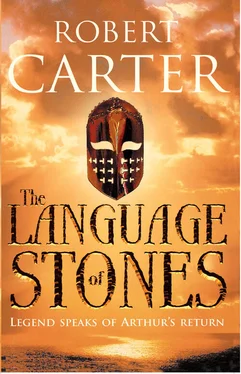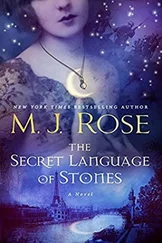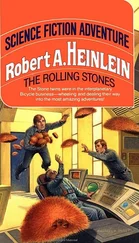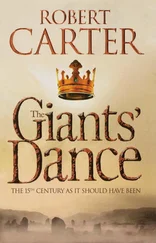When he knelt down to try to discover what it was, it felt cold to his fingers, like metal, and as he scraped the hard earth from around it he saw that it was curved, a metal rim – like the edge of a goblet – sticking out of the ground.
The more he scraped the freer the goblet became, until he was able to pull it out. Then he saw it was no goblet at all, but a horn, clogged with earth, the silverwork upon it battered and tarnished black but a horn all the same. It was not the sort that shepherds blew, but the kind warriors winded to send a warning clear across a valley. Even in the starlight he could see there were words cut in the metal.
He knocked the dirt out of it and tucked it into his bundle. Then, with a heavy sigh, he lay down to sleep.
The next day they travelled onward, following the meandering path that climbed up the ridge. They passed a great bank of bracken that was overgrown with bindweed. It parted before Gwydion’s steps, and the many pale pink flowers closed up and seemed to nod respectfully as he climbed up between them. Will saw revealed another ancient earth enclosure much like the one in which they had rested on their way to the Wychwoode. This ruin was round in form, and Gwydion said it was the remains of a burgh , a dwelling camp, built in a time when all men raised their homes in timber and thatch and did not arrogantly root out the bones of the earth for the sake of vanity.
‘They used only those stones which the earth itself offered up. A great gate once stood here. How wondrously worked were the timbers of that camp, how great the magic knotted into its carven beams. But great though the ancient camps were, all of them fell easily to the iron-girt invader.’ Gwydion’s eyes flashed. ‘There was no defence against Slaver steel and Slaver sorcery once the Isles were betrayed. The Slavers were the beginning of the darkness that has ever since shadowed this land. I do not say such a thing easily, but I would that Gruech had never lived!’
‘Gruech? Who’s he?’
‘A foul traitor! One whose bones lie in a dusty cave far away.’ Gwydion grunted. ‘Let me tell you how it was: King Hely reigned forty-four years, longer than any king of the line of Brea since Dunval the Great, and his first son was called Ludd. When Ludd became king, he rebuilt Trinovant, the city that Brea had founded near a thousand years before. So great were King Ludd’s works that the city was renamed Caer Ludd, in his honour, but on his death the name Trinovant was taken up again. Ludd’s body was interred in one of the great gates of the city that bears his name – Luddsgate. It was I who gave his funeral oration, and at that time I made known certain truths that disqualified Ludd’s son, Androg, from the kingship.
‘This was well done, for Androg was possessed of a weak spirit, and four years after Ludd’s death, during the reign of his brother Caswalan, there turned out to be much work for a strong leader. The mighty power from the East that we called “the Slavers” first invaded the Isles. They claimed they had come on the Day of Auspices, one thousand years to the day since the landing in the Isles of the hero Brea. By this boast they sought to terrify the people, for Iuliu, the captain-general of the Slaver army, was a famous seer and he had said that the line of Brean kings could stand only so long.
‘But our bards sang well their histories in reply. They countered that the true Day of Auspices must already have passed unmarked during the reign of King Hely, and Iuliu’s prediction was therefore false. Thus were our warriors heartened, and afterwards they scorned the claims of the enemy, even when what they said was true. Now as the first Slaver foot stepped upon shingle shore, the lorc awakened. It happened exactly as the fae had always intended it should. Soon a great battle was fought, and one of Ludd’s younger brothers, Neni, who was a master of many arts, fought bravely against the Slaver armies that day, though in the end he paid dearly for his enterprise. The Slavers were setting camp on the banks of the River Iesis when the great clash came. Neni’s men rushed upon them and he himself captured the Slaver sorcerer’s sword, but it cut him and the poison entered his body, so that he died of his wounds fifteen days later and was interred in another of the northern gates of Trinovant. The sorcerer’s gilded blade which he took as spoil, and which he named Thamebuide, or “yellow death”, was buried with him.
‘And that’s how the Slavers won the Realm?’ Will said, frowning.
‘Oh, not so! The Slavers’ ill-fated first invasion was ended by their captain-general, Iuliu the Seer. Ever since landing on the shingle shore, he had been troubled. He suffered falling fits and terrible night visions, both of which were conjured in his mind by the lorc. So affected was he that after the great battle fought against Caswalan and Neni, he chose to withdraw his dread army back across the Narrow Seas. He returned with it to his great capital of Tibor where he vowed never to trouble the Isles again. Iuliu the Seer became a despot upon his own people and was murdered by his friends.’
Will scratched his head. ‘Then how did the Realm pass to the Slavers?’
‘A hundred years later we were betrayed by one of our own.’
Will nodded. ‘And that must have been Gruech’s doing?’
‘Indeed it was. And all the worse for he was one of the druida, and a bard. There could have been no greater betrayal than his.’
Gwydion strode onward in silence then, and a little while later they passed by some ancient stones and the wizard explained that this was the place where Welan son of Wada had forged the exquisite bronze sword called Balmung, the same that had shaved the scales from the dragon’s ribs.
‘These stones mark the place where Wada was laid to rest by his grateful people.’ The wizard’s lips pursed wryly. ‘Had Welan but known how, he might have charmed Flenir to his will, and then there would have been no need to forge a sword. There is no need to dig earth-iron from holes when you have skill in your hands and in your head. The earth gives up freely all that a wise man needs. She holds fast to that which should not be had by fools. Alas! The earth can never give all that men desire, for men’s desire is limitless.’
But Will’s mind was already bounding along another path. ‘Could the great dragons be tamed by words alone, then?’
‘Tamed? Never! But charmed certainly. At least in some measure, for the greatest of the dragons were vain and greedy beasts, and those are failings against which compliment and flattery most easily succeeds. In that, dragons were much like kings.’
Will looked back the way they had come. In the bright summer sun he could see for many leagues, and the view served to make him wonder at the vastness of the Realm and how small was the world that he had hitherto known.
‘Where are we going, Master Gwydion?’
‘That question again? Over hill and down dale to sup with the king.’
Will sucked his teeth, hating to be so casually talked down to. ‘There and back to see how far it is,’ he muttered.
Gwydion poked him good-naturedly with the foot of his staff. ‘We go to the king to offer him consolation in his time of trouble. But travelling is not simply an attempt to arrive somewhere by the shortest possible route. A destination must be arrived at properly, for there is much more in the going than there is in the getting there.’
‘You’re not making much sense.’
‘Then let me put it plainly – there may be those whom we might wish to meet with on the way, or those who might wish to meet with us.’
Will sighed. The crane bag seemed to be heavier, though he knew it could not be. Then he realized that it was weighed down with a secret. He had not yet told Gwydion about the silver-bound horn. I’ll tell him about it when he tells me where we’re going, he thought, and swapped the bag from hand to hand. Fair trade is no robbery, and that’s a Valesman’s rede!
Читать дальше












